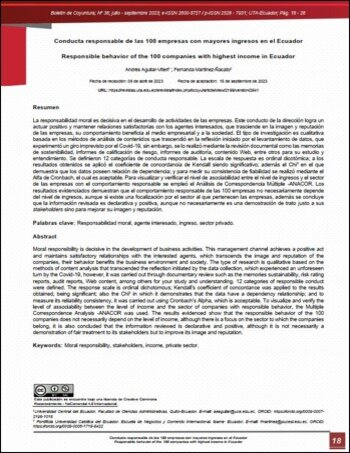Responsible behavior of the 100 companies with highest income in Ecuador
Main Article Content
Abstract
Moral responsibility is decisive in the development of business activities. This management channel achieves a positive act and maintains satisfactory relationships with the interested agents, which transcends the image and reputation of the companies, their behavior benefits the business environment and society. The type of research is qualitative based on the methods of content analysis that transcended the reflection initiated by the data collection, which experienced an unforeseen turn by the Covid-19, however, it was carried out through documentary review such as the memories sustainability, risk rating reports, audit reports, Web content, among others for your study and understanding. 12 categories of responsible conduct were defined. The response scale is ordinal dichotomous; Kendall's coefficient of concordance was applied to the results obtained, being significant; also the Chi² in which it demonstrates that the data have a dependency relationship; and to measure its reliability consistency, it was carried out using Cronbach's Alpha, which is acceptable. To visualize and verify the level of associability between the level of income and the sector of companies with responsible behavior, the Multiple Correspondence Analysis -ANACOR was used. The results evidenced show that the responsible behavior of the 100 companies does not necessarily depend on the level of income, although there is a focus on the sector to which the companies belong, it is also concluded that the information reviewed is declarative and positive, although it is not necessarily a demonstration of fair treatment to its stakeholders but to improve its image and reputation.
URL: https://revistas.uta.edu.ec/erevista/index.php/bcoyu/article/view/2186
Downloads
Article Details

This work is licensed under a Creative Commons Attribution-NonCommercial 4.0 International License.
![]()
The publications of the Boletín de Coyuntura are licensed under a Creative Commons Attribution-NonCommercial 4.0 International License (CC BY-NC 4.0). The Universidad Técnica de Ambato retains the copyright of the published works, and favors and allows the reuse of these, as long as: the authorship and original source of publication is cited, and they are not used for commercial or onerous purposes. The intellectual property of the published articles belongs to the authors.
References
Boatright, J. (1994). Fiduciary Duties and the Shareholder-Management Relation: Or, What's so Special about Shareholders? Business Ethics Quarterly, 393-407.
Burton, B., & Dunn, C. (1996). Feminist Ethics as Moral Grounding for Stakeholder Theory. Business Ethics Quarterly 6(2), 133–148.
Camacho Laraña, I., Fernández Fernández, J., González Fabre, R., & Miralles Massanés, J. (2013). Ética y Responsabilidad Empresarial. Bilbao: Desclée De Brouwer S.A.
Cazau, P. (2013). Introducción a la Investigación de las Ciencias Sociales. In Introducción a la Investigación de las Ciencias Sociales (p. 194).
Colvin, R., Witt, B., & Lacey, J. (2020). Power, perspective, and privilege: The challenge of translating stakeholder theory from business management to environmental and natural resource management. Journal of Environmental Management. doi:https://doi.org/10.1016/j.jenvman.2020.110974.
Consorcio Ecuatoriano para la Responsabilidad Social -CERES. (2020, enero 30). Retrieved from sitio web www.redceres.org: http://media.wix.com/ugd/8c779e_ce18bc03a3584ef18a8da1ab0516ccc2.pdf
Cortina, A. (2009). Ética de la Empresa: No sólo Responsabilidad Social. Revista Portuguesa de Filosofia, 113-127. Retrieved from http://www.jstor.com/stable/41220792
Donaldson, T., & Dunfee, T. (1999). Ties That Bind. Harvard Business School Press.
Freeman, E., & Phillips, R. (2002). Stakeholder theory: A libertarian defense. Business ethics quarterly, 331-349.
Freeman, E., & Reed, D. (1983). Stockholders and stakeholders: A new perspective on corporate gorvenance. California management review, 88-106.
González Campo, C. H. (2010). E-Stakeholders: Una aplicacion de la teoria de los Stakeholder a Los Negocios Electronicós. Estudios Gerenciales, 39-57. doi:https://doi.org/10.1016/S0123-5923(10)70101-7
Goodpaster, K. (1991). Business Ethics and Stakeholder Analysis. . Business Ethics Quarterly, 53–73.
Guillén Parra, M. (2006). Ética en las organizaciones. Construyendo confianza. Madrid: Pearson Educación S.A. .
Harrison, J. S., & Wicks, A. C. (2013). Stakeholder Theory, Value, and Firm Performance. Business Ethics Quarterly, 97-124. Retrieved from www.jstor.org/stable/41967821
Hörisch, J., Freeman, R. E., & Schaltegger, S. (2014). Applying Stakeholder Theory in Sustainability Management: Links, Similarities, Dissimilarities, and a Conceptual Framework. Organization & Environment, 328-346. Retrieved from www.jstor.org/stable/26205126
Instituto Brasilero de Gobernanza Corporativa IBGC. (2011). Retrieved enero 30, 2020, from http://www.ibgc.org.br: http://www.ibgc.org.br/userfiles/files/CodigoIBGC_4a_ed_espanhol.pdf
International Accounting Standard Board - IASB. (1987). Norma Internacional de Contabilidad 18.
Lefort, F. (2003). Gobierno Corporativo: ¿Qué es? y ¿Cómo andamos por casa? Cuadernos De Economía, 207-237. Retrieved from http://www.jstor.org/stable/41951438
Moreno Pérez, C. M. (2017). Ética de la Empresa: (De la ética, de la empresa, de la vida). Barcelona: Herder Editorial S.L.
Perú 2021. (2020, enero 30). Retrieved from https://issuu.com/peru2021/docs/26-03-2016-stakeholders
Phillips, R. A. (1997). Stakeholder Theory and A Principle of Fairness . Business Ethics Quarterly, 51-66.
Phillips, R., & Reichart, J. (2000). The Environment as a Stakeholder? A Fairness based apprach. Journal of Business Ethics, 185-197.
Plaza Úbeda, J. A., De Burgos Jiménez, J., & Belmonte Ureña, L. J. (2011). Grupos de interés, gestión ambiental y resultado empresarial: una propuesta integradora. Cuadernos de Economía y Dirección de la Empresa, 151-161. doi:https://doi.org/10.1016/j.cede.2011.02.001
Rincón, C. A. (2016). La contabilidad como un juego de lenguaje. Cuadernos de Administración (Universidad del Valle), 33-46. Retrieved from http://www.scielo.org.co/scielo.php?script=sci_arttext&pid=S0120-46452016000100004&lng=en&tlng=es
Roberts, C. W. (2015). International Encyclopedia of the Social & Behavioral Sciences (Second Edition). Elsevier. doi:https://doi.org/10.1016/B978-0-08-097086-8.44010-9
Starik, M. (1995). Should Trees Have Managerial Standing? Toward Stakeholder Status for Non-Human Nature. Journal of Business Ethics, 207-217.
Superintendencia de Compañías. (2021). Superintendencia de Compañías. Retrieved abril 12, 2021, from https://www.supercias.gob.ec/: https://www.supercias.gob.ec/portalscvs/
Van Buren, H. J. (2001). If Fairness is the Problem, Is Consent the Solution? Integrating ISCT and Stakeholder Theory. Business Ethics Quarterly, 481-499. doi:https://doi.org/10.2307/3857850
Volpentesta, J. R. (2017). Creación de un método de integración de grupos de interés al gobierno de las empresas. Estudios Gerenciales, 195-217.
Wicks, A. C., Gilbert, D. J., & Freeman, E. (1994). A Feminist Reinterpretation of the Stakeholder Concept. Business Ethics Quarterly, 475–498. doi:doi:10.2307/3857345


